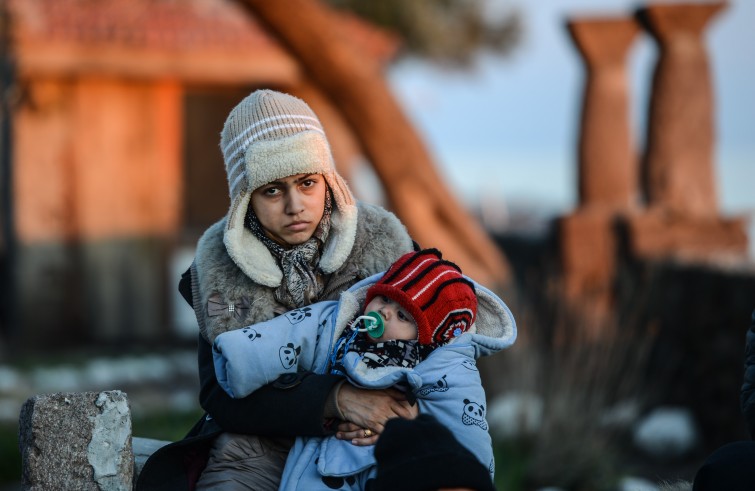World Day
For Monsignor Guerino Di Tora, President of the Migrantes Foundation, head of the Commission for Migrants within the Italian Bishops’ Conference (CEI), “the picture would change completely if only 2.5 migrants were housed every thousand inhabitants.” The Catholic community “fails to understand that the Pope is drawing attention to a specific trait of Christian experience that is concretized in history and in contemporariness.” “We are living in a globalised world. People are on the move. The migration phenomenon is an epochal issue which some Catholics tend to ignore and to reject. We have adapted ourselves to a Christian form of life marked by wellbeing and we only look after our own interests.”

In 2015 65.3 million people were displaced from their homes, of which 21.3 million were refugees, 40.8 million internally displaced and 3.2 million asylum seekers. In Italy, according to data released by the International Protection Report updated to October 2016, some 171 thousand people are hosted in shelter homes nationwide. In this regard, “Italian politics is at a crossroads,” cautioned Monsignor Guerino Di Tora, President of the Migrantes Foundation, head of CEI’s Episcopal Commission for Migrant persons: “Populism goes all out to spread the culture of non-acceptance. But if each municipality housed two immigrants and a half per thousand inhabitants, the picture would change completely.”
In his message for the World Day of Migrants and Refugees the Holy Father called for a “far-sighted perspective” on the part of the international Community. What is Italy doing in this respect?
Italy is doing its share. It’s the first border-Country in Europe, characterised by a prevailing form of transit migration. It is necessary to identify the best ways to ensure inclusion.
If thousands of migrants are crammed in a reception centre, often in precarious conditions, problems are likely to arise, as has occurred in the past few days. When there are only three daily occasions for active sharing – breakfast, lunch, dinner – and the rest of the day is spent doing nothing, people can be overcome by desperation.
For Francis the reception of migrants is a central issue. However, many Catholics appear to strive to follow him. Why?
Unfortunately, this is the way things stand. Sometimes, members of the Catholic community fail to understand that the Pope is highlighting a distinctive trait of Christian life, concretized in history and in contemporariness. People are on the move. The migratory phenomenon is an epochal issue. However, even Catholics appear to underestimate it or reject it.
We have adjusted to a form of Christian life characterised by wellbeing. We only look after our own interests.
We have grown inward-looking, the Christian experience has increasingly identified itself with prayer and liturgy, thereby neglecting human relations. But Christianity is relational. The experience of caring for others is fundamental. Nonetheless, it is being sidelined as a result of the unwillingness to make the effort of going out and questioning our certainties.

Did the economic crisis have a negative impact on the growing closures and insecurities?
In my opinion it hasn’t: it occupies a minor role compared to the centrality of Christianity. Although migration is not a new phenomenon, in other epochs people tended to share everything. It occurred in the period after the World Wars and when our fellow-nationals migrated abroad. In the present historical circumstances egoism and individualism prevail. Personal interest takes precedence over everything else.
Our Christian experience is exterior, rationalist, unreal.
“He who does not love his brother whom he has seen, cannot love God whom he has not seen”, writes Saint John. And the figure of Pope Wojtyla reminds us that man is the way leading to Christ. Caring for others must be part and parcel of our way of living as Christians.
For Francis, “children are defenceless in a threefold way: they are children, they are foreigners, and they have no means to protect themselves.”
It’s a serious problem that involves not only the migrant persons. In fact, the next Bishops’ Synod will focus on young people. If we neglect children we fail to worry about their future, heedless of the situation we will be facing in the near future. Minors in conditions of economic prosperity feel disoriented, and all the more are those coming from distant Countries, far from those they hold dear. Many of them are seen as the objects of exploitation even in their home countries: it is the case of minors reduced to slavery for labour purposes, as happens in Asia on behalf of Western multinational undertakings.

In this regard, the Pope said, “If more rigorous and effective action is not taken against those who profit from such abuse, we will not be able to stop the multiple forms of slavery where children are the victims.”
Child-protection policies are urgently needed, starting with the school integration of migrants. The family environment equally deserves special attention in order to prevent the plight of unaccompanied children. I recall a mother being asked where she found the courage to hand over her child to the high seas. She replied: ‘Sea waves are safer than the mainland harboured by war and death.’ That’s why creating favourable conditions for children whilst fighting their exploitation is of primary importance.”
We must be aware of the fact that if in some Countries death and violence occur on a daily basis it’s because we don’t do enough to change the harsh reality.